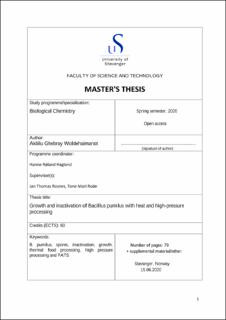| dc.description.abstract | The main objective of this study was to obtain knowledge about Bacillus pumilus B367 with relevance to food safety and investigate if B. pumilus B367 would be inactivated at lower temperatures for shorter time by applying pressure-assisted thermal sterilisation (PATS) than the classical thermal processing for food matrixes. B. pumilus is a spore-forming bacterium, and at favourable environmental conditions, it can grow in foods and produce toxins.
The experiment started with finding the temperature that inactivated B. pumilus spores in nutrient broth in a water bath. Similar experiments in water bath were then carried out with spores in plastic bags and tuna fish, and finally, inactivation experiments in high-pressure equipment combined with moderate temperature. Growth of potential of surviving B. pumilus was also examined with different types and concentrations of preservatives used in food using a turbidometer (Bioscreen C). Different concentrations of sodium chloride (NaCl), potassium chloride (KCl), and sodium nitrite (NaNO2) as well as different levels of pH were applied to B. pumilus to investigate the growth process of vegetative cells and activated and non-activated spores. The impact of sporulation temperature on the heat resistance of spores was also studied. Pressure-assisted thermal sterilisation (PATS) was used to investigate the inactivation of spores in tuna fish.
Heat treatment in a water bath gave 1.8, 3.4, and 5.6 log-reduction of spores in LB medium at 80, 90, and 95 oC for 10 minutes, respectively. Further, a 2.8 and 4.4 log-decrease of spores in tuna fish was obtained at 90 and 95 oC for 10 minutes, respectively. The heat treatment with preservatives (2 % NaCl, 2 % KCl, and 250 ppm NaNO2) showed a 2.2-2.5 log-reduction of spores at 90 oC for 5 minutes, and a 3.6-3.8 log-decrease at 95 oC for 5 minutes. As the pH of the medium was reduced from pH 6.2 to 4.0, the inactivation of B. pumilus spores increased at the given temperature-time combinations of heat treatment. The spores that sporulated at higher temperatures showed higher heat tolerance. In the experiment with PATS, a 3.5 and 3.7 log-reduction of spores in tuna fish was achieved at 600 MPa-55 oC and 600 MPa-65 oC, respectively. The growth experiment with different preservatives revealed that mean time to detection (TTD) measured at an optical density (OD) of 0.2 absorbances were longer as the concentration of NaCl and KCl increased from 1 % to 4 %, the concentration of NaNO2 increased up to 500 ppm and pH decreased from 6.2 to 4.0. Thus, as the concentrations of NaCl, KCl, and NaNO2 were increased and when the pH of the media decreased, the growth of B. pumilus was reduced. | en_US |

